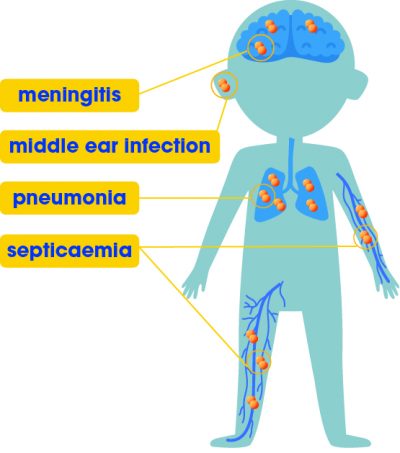The Ministry of Health announced that babies born from Jan 1, 2020 onwards now qualify for the free pneumococcal vaccination from government hospital and clinics, slated to start in June 2020.
The vaccine against pneumococcal disease is the latest to be added to Malaysia’s National Immunisation Programme (NIP).
What is pneumococcal disease?
An infection caused by the bacteria Streptococcus pneumoniae.

Potential complications include septicaemia, pneumonia, meningitis and middle ear infection in young children.
How the vaccine works
Like all vaccines, the vaccine against pneumococcal disease helps to prime the body’s immune system and prepare it against specific infections. There are two types of pneumococcal vaccines, namely:
- Pneumococcal conjugate vaccine (PCV). Depending on the vaccine, it can protect against up to 13 pneumococcal strains. The US Centers for Disease Control (CDC) also recommends it for children/ adults from 6 weeks onwards.
- Pneumococcal polysaccharide vaccine (PPSV). The vaccines available in the market protect against many different strains of pneumococci. PPSV can only be given to children above 2 years of age.
Both vaccines are made using parts of the bacteria, but the major difference is PCV provides a stronger “immune memory” effect which greatly benefits herd immunity protection. Thus PCV is preferred for NIP. PPSV is estimated to last five years on average, and booster shots may be required.
Effective population protection
A minimum of 95% of the population has to be vaccinated to achieve maximum protection (i.e. herd immunity) for the rest of the population. This vaccine coverage may be lower for herd immunity against invasive pneumococcal disease.
Possible after effects
PCV and PPSV have been in the market for many years and are generally safe. Common after-effects from injection which lasts a day or two are:
- Swelling or redness at the injection site.
- Feeling tired or drowsy.
- Temporary loss of appetite.
- Mild fever (high fevers are not common but may occur).
- Fussiness or irritability.
Adults need it too
One shot of the 13 valent vaccine (PCV13) is also recommended for high risk adults and those beyond 50 years of age. Women are advised to get vaccinated before pregnancy. Lastly, remember that vaccination saves lives so don’t delay if you have never received a pneumococcal vaccine.
Teens and adults should be vaccinated if they:
- live in crowded places such as dormitories.
- travel to the meningitis belt (in sub-Saharan Africa, stretching from Senegal in the west to Ethiopia in the east).
- are 50 years or older.
- have compromised immune systems, etc.
This not only prevents pneumococcal disease but also prevents you or your child from becoming carriers and spreading pneumococcal disease.
An educational contribution by Malaysian Paediatric Association.






Comments